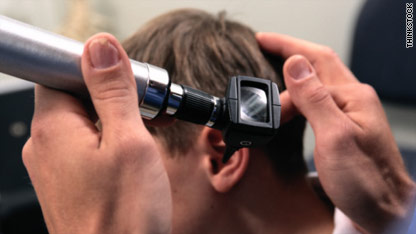Below is an article I got from cnn.com. Apparently teen hearing loss is on a rise in the US. The article attributes this to the increased use of technology - particularly listening to IPODS at high volumes. I think it's worth considering a link to cell phone radiation. Read below for more info.

Researchers looking at hearing loss in people ages 12 to 19 found that when compared with data from the mid-1990s there has been a 30 percent increase in the development of minimal levels of hearing loss, and a 77 percent increase in more serious hearing problems – those where obvious communication difficulties can be observed. About one in 20 children experienced hearing loss in 1994, and that number jumped to about one in 5, or an estimated 6.5 million adolescents, by 2006.
“What we're seeing is a big jump in the prevalence of hearing loss in a very short period of time, in less than one generation,” says Dr. Roland Eavey, an author on the study. “That means we're on the front edge of an epidemic.” The results were published today in the Journal of the American Medical Association.
Hearing loss is a serious problem that can lead to developmental delays for school-aged children. Even though the condition is common, getting to the root of the problem remains a challenge.
The authors of the JAMA article conclude that more studies are needed to determine the exact cause of the increase. “We see smoke,” Eavey explains. “We’re not sure where the fire is yet, but we know it’s not good for the woods to be burning."
Dr. Gordon Hughes, an otolaryngologist with the National Institute on Deafness and other Communication Disorders, agrees that the findings are significant and says the next step is moving beyond epidemiological analyses.
“You're taking a cross section of the population in certain age groups, and then comparing what you see from then to now,” he explains. “You cannot prove cause and effect with that.”
Both Eavey and Hughes say future studies should probe more specifically into questions about noise and music. Even though the 2005 – 2006 survey included a question asking participants whether they had been exposed to loud noise or music for five hours or more a week, Eavey says adolescents may simply reply “no” to a question either because they don’t understand the significance, or because to them a loud rock concert might be the norm. Asking "have you experienced ringing in your ears in the last three months," could really help pinpoint the cause, he suggests.
Despite the absence of a causal link, experts say technological trends popular among adolescents can’t be ignored.
"I believe this is rooted in a cultural paradigm shift in terms of how electronics have become 'the thing,'” says Tommie Robinson, president of the American Speech-Language Hearing Association. "Everyone has something in their ears."
According to the Consumer Electronics Association the first MP3 player went on sale in the U.S. in 1998, and today it is projected that MP3 players will outsell all other home audio products for the sixth consecutive year in 2010. Portable MP3 players remain among the list of top products teens request during the holiday season.
Recent reports find that not only do teenagers play music at louder volumes, but they are completely unaware they are doing so, and Robinson says this new data support the need for concern about how the devices are used. “I'm not surprised by these results,” he says. “You could see it coming.”
For parents who are concerned there are things you can do. “If you’re giving your 12-year-old an iPod, one proactive thing you can do is set the volume limit on the device,” Eavey suggests. Apple provides detailed instructions on how to do this on its website. Also, the Listen to Your Buds website provides resources to help your child understand when it’s time to turn down the volume. The National Institute on Deafness and Other Commnication Disorders website includes a How Loud Is Too Loud bookmark that explains the decibels of common noises and how much prolonged exposure is considered unsafe. And if you suspect your child might already suffer from some hearing loss, you can find a certified audiologist in your city on the ASHA website.
“It’s important that families keep in mind that hearing cannot be replaced,” Robinson says. “Once it's gone, it's gone.”
http://pagingdrgupta.blogs.cnn.com/2010/08/17/adolescent-hearing-loss-on-the-rise-in-u-s/?hpt=C2
No comments:
Post a Comment